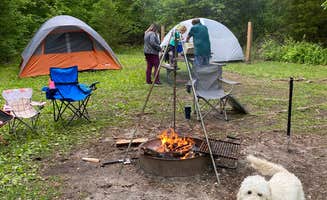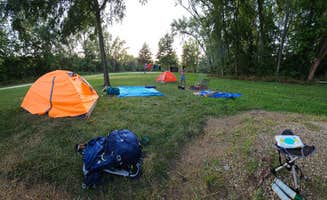Tent camping opportunities near Pacific, Missouri span from remote Mark Twain National Forest sites to county parks along the Missouri River. The terrain features rolling Ozark foothills with elevations between 500-1,100 feet, creating varied camping conditions. Summer temperatures typically reach 85-95°F with high humidity, while spring and fall offer milder weather with occasional rain.
What to do
Fishing access: Brazil Creek offers primitive camping with creek fishing opportunities. A camper noted, "The camp is right by the creek which is ice cold and good for sticking sore feet in. There are also a few fish in there."
Mountain biking trails: Klondike Park features technical mountain biking sections within the park boundaries. One reviewer highlighted this advantage: "One other really cool thing about Klondike is there are several technical mountain bike sections that are located in the park. Bring your mountain bike and have a go!"
Float trips: Old Cove organizes float trips directly from campsites. According to a camper, "For float trips they pick you up from your campsite and bus you to your put in point. You can float the Meramec for 4 or 9 miles and you end back at the campsite."
Winery tours: Multiple camping locations put you near Missouri wine country. A visitor to Klondike Park mentioned, "Close enough to wineries to bike to."
What campers like
Privacy variations: Different sites at St. Charles County Klondike Park offer varying degrees of seclusion. A camper described, "Best campsite ever! Even has a shared camp kitchen very clean showers house very spacious some campsites are close together but everyone seemed nice."
Creek access: Courtois Creek Dispersed camping puts tents right beside flowing water. A reviewer appreciated that it's "Very scenic and beautiful right on the river" while another called it "gorgeous camp site."
Trail connections: Several campgrounds connect directly to the Katy Trail, a 240-mile rail trail. One reviewer noted, "I have bike-packed along the Katy and this is an excellent spot for an overnight(s) stay. It is a tough, but short, climb from the trail."
Free camping options: Little Lost Creek Conservation Area provides free primitive camping with hiking trails. A camper mentioned, "There is a great hike down into a valley with the actual Lost Creek at the bottom, completely worth the hard hike back up out of the valley."
What you should know
Road conditions: Some dispersed camping areas have difficult access roads. A Courtois Creek visitor warned, "The road to get there isn't a road so much as a ATV trail. All wheel drive and it was too hard on my Subaru. Mostly washed out."
Permit awareness: Conservation areas have restricted camping during hunting seasons. A visitor to Little Lost Creek noted, "The conservation area is closed to camping during various hunting seasons(I ran into a hunter scoping out his turkey hunting spot for the following week's hunt)."
Cell service limitations: Brazil Creek has inconsistent cell coverage. A camper shared, "I have at&t and ive been getting 1 to 3 bars. But the other person im camping withuisnt grtting anything with their provider."
Navigation challenges: Prepare paper maps for remote locations. A Brazil Creek visitor advised, "Have an actual map handy and make any calls before you get here because your phone will do you no good."
Tips for camping with families
Campsite selection: Look for specific sites with more space at Klondike Park. A camper recommended, "Other sites like #19 and 20 were more secluded, offered more trees and privacy."
Wildlife encounters: Prepare for animal visits at campsites. One visitor to Courtois Creek described, "I heard a heavy-bodied splash in the creek right by me. And when I tell you I bolted to the car so fast leaving behind a tangled trail of chair, blanket, charger cable, etc."
Swimming options: Many creek-side locations offer water access. A Courtois Creek visitor mentioned, "We were the only people camping there until the next afternoon when a couple families came down with kids to swim and float. The water is amazing."
Supply planning: Most primitive sites require complete self-sufficiency. A Brazil Creek camper advised, "This is a bare bones campground, located in Mark Twain National Forest, it has a place for you to camp and a fire pit, that's it. No facilities, no water, no bathroom, no lights."
Tips from RVers
Site limitations: The best tent camping near Pacific, Missouri rarely accommodates larger RVs. A visitor to Dr. Edmund A. Babler Memorial State Park Campground noted, "Not all sites are long enough for large RVs and the roads in some loops prevent you from turning around. The camp hosts we encountered are very helpful and have a list of site lengths and can tell you which ones are appropriate for large RVs."
Tent platform considerations: Many established campgrounds have concrete pads rather than soil. A reviewer mentioned, "You might end up pitching your tent on a parking pad as many tent sites don't have level grassy spots for your tent."
Seasonal facility closures: Check which amenities remain open in off-seasons. A camper reported, "Not having water available except at the camp host, and no open restrooms and showers until after April 1, regardless of when the last freeze is was inconvenient for a spring break trip."



